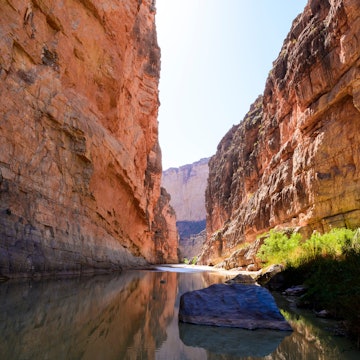

Texas has some incredible hikes that are suitable for every age group © fstop123 / Getty Images
As the second-largest state in the USA, it’s no surprise that Texas has two national parks, 12 nationally protected areas, and 80 state parks and recreation sites. And there's no better way to explore these outdoor spaces than on a hike.
Some trails cut through remote canyons and mountains along the borders of the state, while others are a short drive from a downtown metropolitan area. The Lone Star State has one of the most diverse sets of ecosystems in the country, allowing you to take trails that meander through wetlands, others that weave through forests, flat trails leading you through fields of wildflowers on prairies and plains, and colorful, rocky desert treks.
With so many places to hike in Texas, it can be hard to know where to start. We’ve gathered some of our favorite trails, but we encourage you to look beyond this list with every visit. The landscapes of Texas are broad and diverse, and hikers will discover wonderful environments no matter where they go.
1. South Rim Trail in Big Bend National Park
Best day hike
12.5 to 15 miles roundtrip, 6-7 hours, difficult
Big Bend National Park is one of the two national parks in Texas and it covers the arid Chisos Mountain Range along the Texas-Mexico border. The park has grown in popularity with hikers over the last ten years, though not everyone can manage the South Rim Trail. A 12.5-mile hike is difficult enough for even an advanced hiker, but when you consider that temperatures here regularly go over 100F, it can be a treacherous trek if you're not properly prepared.
Wear your most durable hiking shoes on this mountainous loop trail. Expect some steep ascents and a 2000-ft elevation gain that results in views of the mountains of Northern Mexico. Keep an eye out for signs of black bears, mountain lions, deer, lizards, and Mexican jays.
If 12.5 miles in one day is too much, consider backcountry camping along the trail. You can also add a trek to Emory Peak, which is an additional 3 miles. As the highest peak of the Chisos Mountain Range, the views on Emory Peak are well worth the additional 1.5 hours of hiking.
2. Ottine Swamp Trail at Palmetto State Park
Best hike for families
1.01 miles, 1 hour, moderate
Discover a tropical haven by hiking the Ottine Swamp Trail in Palmetto State Park. This park is full of dwarf palmettos, many of which can be seen along this hike.
The wide, flat gravel trail is labeled as moderate, but young children and those with lower fitness levels shouldn’t have an issue on this path – it features tropical greenery and entrancing swamps. Keep an eye out for armadillos, deer, and beautiful birds.
You can choose to make a pit stop at the historic Civilian Conservation Corps Water Tower, which pumps water into the wetlands of Palmetto State Park. Make sure to bring mosquito spray, as this state park is muggy, which creates the right conditions for pesky skeeters.

3. Lighthouse Trail in Palo Duro Canyon
Best canyon trail
5.8 miles roundtrip, moderate
Texas is home to the second-largest canyon in the United States – Palo Duro Canyon. The Lighthouse Trail is the most popular hike in this state park (expect a lot of other hikers) because it leads to its namesake, a rock formation known as The Lighthouse.
Located in the Texas Panhandle, this canyon has a dry, hot climate. In fact, this trail sees the most heat-related injuries and deaths for people and pets than any other trail in the park. It’s imperative that you bring lots of water and take care when climbing along the cliffs or rock structures.
During your hike, you’ll see desert shrubs, cacti, and amazing geological features. If you visit in the spring, wildflowers add more color to the already colorful landscape. Keep an eye out for the elusive Texas Horned Toad, an endangered species that looks like a lizard with a spiky back.
4. Rio Grande Trail in Bentsen-Rio Grande Valley State Park
Best for bird watching, wheelchair accessible
1.8 miles, easy
Many people are unaware that certain areas along the Texas-Mexico border are a birder’s paradise. In fact, the Bentsen-Rio Grande Valley State Park in the border town of Mission, Texas, is part of the World Birding Center and home to 360 species of birds, like the Plain Chachalaca, Great Kiskadee, and Altamira Oriole. It’s also a stopover for migratory hawks, and home to other animals like bobcats, butterflies, and javelinas.
Go in search of these beautiful birds on the 1.8-mile Rio Grande Trail, a wheelchair-accessible trail that’s perfect for adults and kids of all ages. Be sure to stop at the two-story, wheelchair-accessible Hawk Observation Tower, especially in spring and fall when the hawks can be found in the surrounding canopy. At other times of the year, you can see views of Mexico from the tower.
5. Fate Bell Pictograph Trail at Seminole Canyon State Park
Best to see petroglyphs
1-mile roundtrip, 1 hour, moderate
Humans have inhabited Seminole Canyon State Park for at least 8000 years – ancient communities took shelter in the Fate Bell cave and they left behind beautiful pictographs that experts believe were drawn 4000 years ago.
Today, you can see these pictographs by taking a guided hike (self-guided hikes are not available for this site) with a park ranger to the Fate Bell Site. After hiking through a stunning canyon, you’ll arrive at the historic site and your guide will talk you through the colorful paintings and rock ovens where ancient people prepared meals.
Visit quickly as some of these pictographs are estimated to fade completely within 20 years due to exposure to the elements.

6. East Trail at Lost Maples State Park
Best forest hike and best overnight hike
3.1 miles, 3 hours, difficult
Lost Maples State Park is home to the Uvalde Bigtooth Maple trees, a swath of maple forest that survived changes in the climate after the Ice Age. See these precious maples, as well as Bald Cypress and Sycamore trees, on a hike that's just over 3 miles on the East Trail.
This hike is especially wondrous during the fall when the leaves change color, but that doesn’t mean it isn’t a glorious hike year-round. The trees, as well as unique formations like the monkey-shaped Monkey Rock and a colorful Grotto, make this the most heavily trafficked trail in the park.
Prepare for a rocky trail with steep ascents and rewarding scenic overlooks of Texas Hill Country and the Sabinal River. There are a few primitive campsites along this trail, as well as a compost toilet.
7. Spicewood Springs Trail at Colorado Bend State Park
Best hike for waterfalls and swimming
3.8 miles, moderate
Colorado Bend State Park offers some rewarding hikes, such as the Gorman Falls Trail that leads hikers to a beautiful waterfall. However, if you only have time for one hike, we’d suggest taking the Spicewood Springs Trail.
It features a dirt, gravel, and rocky trail that takes hikers by lovely pools and waterfalls fed by the Spicewood Springs. From March to October, you can take a dip in the springs and swimming holes, which feel quite wonderful after you’ve hiked up the canyon.
The trail leads across a creek or two, so make sure you have extra socks or water-resistant hiking shoes.

Tips for hiking in Texas
Check the weather
Before taking a hike in Texas, always check the forecast. If the temperature is expected to be 90-110F, you should hike early in the morning. Tornadoes mostly occur in the northern part of the state, while hurricanes and tropical storms affect the south. Weather can change quickly and unexpectedly, so make sure you keep an eye on the sky (and the forecast) during your hike.
Bring more water than you need
Whether you’re hiking in a desert or a humid and muggy area, the reality is that for most of the year it’s hot in Texas, making it imperative that you stay well and fully hydrated. Bring more water than you need on a Texas hike and have electrolytes on hand to consume after you’re done.
Dress appropriately
What you wear on a hike in Texas is extremely important. Good hiking shoes can protect your ankles on rocky and hilly trails or from venomous snakes. Long sleeves and pants are a good idea as they can prevent bug bites (especially from mosquitos), sunburns, and rashes from poison ivy or oak. Sunglasses are a must in sunny Texas, and a hat is always a good idea.
Check for burn bans
As mentioned, Texas can get hot and very dry, especially when there is a drought. Depending on the area of Texas you’re hiking in, there may be a burn ban. This usually means that it’s been deemed unsafe and illegal to make a fire with wood in a campsite.
Snakes
Although there are 105 different types of snakes in Texas, 15 of which are dangerous to humans, you’re still more likely to be killed by a lightning strike than a snake. That said, you could come across a snake while hiking in Texas. If you see one, stay still, and let it move away from you, or back away very slowly. Wearing proper attire, like hiking boots, can protect you from potential bites. However, if you are bitten, seek medical attention immediately.
If you do have concerns about venomous snakes, they can be easily identified by their coloring (copperheads have reddish-brown crossbands on a lighter body), sound (rattlesnakes make a rattling noise), and location (cottonmouths are found near water).
Do not collect artifacts
It’s illegal to take rocks, animals, or other artifacts from a state park in Texas, so be sure to leave everything in its place. This includes flowers too! No matter how beautiful that wildflower may be, it’s against the law to pick it in a state park.















